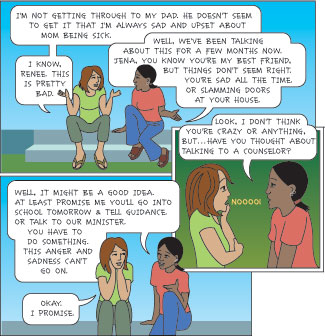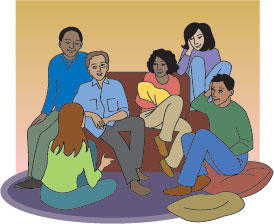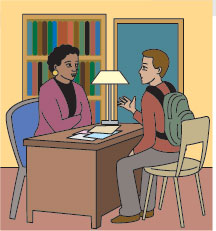|
Finding Support
Tips for Talking With Your Parent
Talking With a Counselor
Why Go to a Counselor?
Finding a Counselor
Joining a Support Group
Don't let being afraid of the way you feel keep you from talking to
your parents, a counselor, or people in a support group.
For many people, starting to talk is difficult. Some teens don't
have good relationships with their parents. Others are too
embarrassed to talk about personal things. It can also just be
hard to make the time to talk, with all that is going on. But you
and your parents really can help each other.
| Prepare before you talk. |
| Step 1: | Think about what you want to say and about some
solutions to the problem. |
| Step 2: | Think about how your parent might react. How will you
respond to him or her? |
|
| Find a good time and place. |
| Step 1: | Ask your mom or dad if they have a few minutes to talk. |
| Step 2: | Find a private place - maybe in your room or on the
front steps. Or maybe you can talk while taking a walk
or shooting hoops. |
|
| Take things slowly. |
| Step 1: | Don't expect to solve everything right away. Difficult
problems often don't have simple solutions. |
| Step 2: | Work together to find a way through these challenges.
Some conversations will go better than others. |
|
| Keep it up. |
| Step 1: | Don't think you have to have just one big conversation.
Have lots of small ones. |
| Step 2: | Make time to talk a little each day if you can, even if it's
just for a few minutes. |
|
"Grandma raised me to care about school.
But after she got cancer, I had too much
on my mind. And there was a lot to do to
take care of her when I got home from
school. My grades started to slip. I told
my guidance counselor what was going on,
and she shared some things that had worked
for others. Now, whenever things start to
get me down, I talk with my guidance
counselor, who helps me feel less stressed.
What's best is that she keeps everything we
talk about private."
- Nick, age 15

Sometimes. . .
talking to friends
is not enough.
When you are having
a hard time,
it can be helpful to talk
to a counselor or
social worker.
Jena listened to her best friend Renee and planned on talking to
the counselor at her school. Other kids talk to social workers at
the hospital. Going to a counselor doesn't mean you are crazy.
It shows you have the courage to see that you need help to get
through a very tough time.
Teens say it can be helpful to talk with someone outside the
family--someone who doesn't take sides. A counselor is a
person who will listen to you. They will help you find ways
to better handle the things that bother you and gain
strength in your situation.
- Talk with your mom, dad, or someone else that you
trust. Let them know you would like to talk to a
counselor. Ask for help making appointments and
getting to visits. Sometimes the counselor will even let
you bring a friend.
- Ask a nurse or social worker at the hospital if they know
someone you can talk to.
- Ask your guidance counselor at school if you can
talk to him or her.
| Tip: Don't be shy about asking
for help. |
|
You may think: "I can solve all my own
problems." However, when faced with tough
situations, both teens and adults need
support from others!
|
Another good outlet is a support group. Some groups meet in
person; others meet online. Some groups go out and have fun
together. In these groups you'll meet other teens going through
some of the same things that you are. At first this may not sound
like something you want to do. Other teens say they thought the
same thing - until they went to a meeting. They were surprised
that so many others felt the same way they did and had advice
that really seemed to work. A doctor, nurse, or social worker can
help you find a support group.


Back to Top
< Previous Section | Next Section > |